- Home
- Steven Becker
Backwater Key Page 3
Backwater Key Read online
Page 3
I had gangs on my mind as we entered the harbor. The ink, cut-off denim, and general disobedience pointed me in that direction. Maybe I was thinking the worst, but coincidences were starting to pile up. Between the timing of the government shutdown, the men aboard the crabber yesterday, and the go-fast boat now, it was hard to believe this was just tourist activity. Then there was the belch of black smoke that had brought us here.
The park was tourist-oriented: boating, fishing, snorkeling, and kayaking were among the popular and legal pastimes. But this was South Florida and smuggling was always not far from people’s minds. Since the ’70s, pot and coke had been a major revenue generator in the area. Some speculated that if drugs were a legal commodity, they would dwarf all other imports. With the heavily laden container ships and cruise liners running in and out of Government Cut, that was saying a lot. Generally the smugglers stayed to the southern part of the park, where it morphed into the Keys. That area was littered with mangrove-covered islands and creeks; perfect for clandestine meets.
The fire that had attracted our attention was short-lived, but we were close and decided to check it out anyway. Often on weekends and holidays, the marina resembled a parking lot with boats rafted together against the packed seawall, but today it was quiet, with only a half-dozen boats tied up to the concrete seawall. Then a high-pitched scream broke the silence.
Ray gave me a look when I reached into the watertight compartment below the helm. Our boats were identical and I had instinctively reached for my gun belt, but this was his boat, and it was not there. Wearing the belt is awkward on a boat. The holster is always in the way and no matter how well-oiled I keep it, the harsh saltwater environment attacks the steel. I would put it on when approaching another craft or land, but on the water you can usually see the threat coming. The woman screamed again, and I saw a crowd gathering around the lighthouse.
“Over there.” I pointed to an empty spot on the seawall. “Can you drop me?”
Ray nodded and nosed the bow toward the concrete abutment. When the gap closed to six inches I jumped and Ray simultaneously put the engine in reverse and backed away. The minute my feet landed on solid ground, I took off at a run. It was less than fifty yards to the lighthouse. I reached it quickly and I pushed my way past the group gathered in a semi-circle around the entrance. Something dripped from above, and when I looked down at the pool of blood on the ground, I knew it was bad.
I looked up to find its source. It wasn’t hard. Hanging over the cast-iron railing of the sixty-five-foot high observation deck was a body. Blood was dripping from a gash across the man’s neck. The coincidences I had just been wrestling with had turned into reality. Only eight hours since the government shutdown, the park appeared to be a pawn in some kind of gang-related chess game. Pulling my phone from my pocket, I ushered the crowd into the shade of one of the few nearby palm trees and asked them to wait there until I could take their statements.
There was clearly no need for first responders and nothing to be done about the body until the medical examiner arrived. After pressing the contact button for Martinez, I walked over to the entrance, and with my fingertip pushed the lighthouse door closed to seal the crime scene. The call went to voicemail and I hesitated before leaving a message. I figured he’d stop in the clubhouse for a drink after the ninth hole and get it then. Shutdown or not, and with or without his blessing, I had a case.
My next call was to the Miami-Dade medical examiner’s office. The park service had little in the way of infrastructure, and relied on the jurisdiction within which the park lay for services. This often caused friction and I had accumulated more enemies in the ego-bloated halls of Miami-Dade than I would have liked. But there were a few people there that I had cultivated a working relationship with and one was detective Grace Herrera. She was my next call.
While I waited for the medical examiner, I pecked out a quick text to Justine. There was nothing she liked better than a dead body, and I wished it were later in the day. She worked the swing shift for the forensics lab and wouldn’t be in until two. After pressing send, I walked over to the shady area and started to interview the witnesses. Most had either been attracted by the smoke or the woman’s scream and seen nothing. Even if they had, they’d realized there were probably gangs involved and had erased the incident from their memories. One man, though refusing to give his name, had seen the boat leave. The description he gave was a dead end. The men had worn long sleeves and hoodies over their vests when he’d seen them, clearly hiding their affiliation.
My next call was to Johnny Wells from ICE. His unit was under the jurisdiction of the Department of Justice and not subject to the whims of the politicians on Capitol Hill. After a quick description of the boat and its occupants, he agreed to see if he could locate them. I had ridden along with him and his team on several cases, and had total confidence in their ability. If the go-fast boat was still on the water, they would find it. The problem was, the geographic area was huge. They could have headed south and holed up in a mangrove-covered key, or just as easily gone north and stashed the boat along the industrial section of the Miami River. Those were only two of the likely options open to them. There were many more.
I had just finished taking names and statements when the Miami-Dade police boat pulled up and docked. Vance Able, the head coroner, hopped out of the Contender and strutted over to me. It wasn’t a cocky strut, just what I’d called a hipster walk; all the coffee they drank must have added a bounce to their step. Sid, the night shift examiner, would have been my first choice, but I got along well enough with Vance though I’d probably have to dodge his request to take him bonefishing again.
“Are the bones running?” he asked, shaking my hand. The product in his well-groomed hair, beard, and the tips of his mustache glistened in the sun and I could see the mandatory plaid shirt under his scrubs.
“I ran into one of the guides last week, and he said they were starting to bite. Maybe later this week, if you want to try.” I offered the carrot, hoping to gain a few points. I really had no problem taking him out; it was more his misplaced expectations of my guiding ability I was worried about. His desire to start with the elusive bonefish rather than working his way up the food chain made for sure disappointment. Add to that his desire to catch one on a fly, and I was totally out of my element. I did okay on my own, mostly on tips from Ray and Chico, but wasn’t sure I was up to taking Vance. I had started fishing the park on my patrols, more to learn the ins and outs of the miles of coastline surrounding the park. I’d caught a few fish, and found a few bodies in the process.
We entered the lighthouse and waited a few seconds for our eyes to adjust to the dim light. When we could see, I followed Vance and the deputy that had brought him out up the winding concrete stairs of the block tower. We reached the observation deck and went outside to the narrow catwalk surrounding the lighthouse. I forgot the reason we were here for a second as I stared at the beauty laid out below me. The colors of the water were indescribable, and from this height, the changes in bottom, from seagrass to sand to coral, were clearly visible. Vance brought me back to the present.
He was leaning over the body. “No doubt it’s a homicide. We better wait for the crime scene techs.” He pulled his oversize phone from his pocket and called for assistance.
I looked around and saw something smoldering and a large black spot where the concrete deck and wall nearby had been scarred by the fire. I walked over to the source of the smoke we had seen. Whoever had committed the murder had burned the victim’s colors. It looked like they’d used a ton of accelerant, the likely cause of the smoke we had seen. I kicked at the pile in the center of the burn and saw a sleeveless denim jacket. It was more intact than I had expected. I guess the accelerant had burned itself out before the jacket incinerated.
The body was Vance’s concern for now, and realizing it would take an hour before the techs reached the island there were some things I wanted to have a look at. We were done up here for
now and walked back down the stairs. “I saw a crabber on the ocean side yesterday and was going to check it out if you want to take a ride while we wait.”
“Cool,” Vance said.
The deputy stationed himself at the door to the lighthouse. Vance and I walked over to the park service boat.
“Guessin y’all found a body,” Ray said.
“Mind if we have a run around the island? I’d like to see the spot the crabber anchored and there’s a grass flat nearby I think might interest Vance.” I hadn’t forgotten the package that I’d seen go overboard either.
He must have caught my meaning and took a hard look at Vance and shook his head. “Ain’t nothin’ to eat on them flats, but if y’all want to have a look, I’m game.”
Vance and I hopped down from the dock and Ray started the boat. After tossing the lines, we idled out of the marina. “They’ll call when the crime techs get here?” I asked.
“Can’t do anything without me,” he said, grinning like a little boy.
I nodded to Ray and he pushed down on the throttle. The boat jumped up on plane harder and faster than I would have dared. We turned to the south and Ray navigated through the markers for Lewis Cut. I pointed to where I had seen the crabber and as we approached, he raised the engine out of the water and dropped to an idle. Fortunately the water was clear and we could see the line between the deeper sand and the shallow flat. There were plenty of prop scars cut through the brown bottom, but one was fresh.
There were few differences between our boats, but Ray’s lacked a Power-Pole, so we were forced to position the boat and anchor alongside the new scar. Ray set us right next to it, and I peered into the crystal clear water. Turtle grass waved in the current and I saw a few of the discarded beer bottles that had been tossed overboard by the gang on the crabber.
“There’re fish here,” Vance said, pointing to a school actively feeding nearby.
I could tell he was excited and wondered if the whole fly fishing thing was a little over his head. Ray caught it, too, and looked over to me. I nodded and he reached into the console, bringing out a spinning rod with an artificial lure made to look like a shrimp.
“Want to give it a shot?” I asked.
“Heck yeah. Just tell me what to do.”
I handed him the rod, and realized he was a total novice. After showing him how to work the bail and drag, I explained how to twitch the rod to make the shrimp appear alive. It turned out he didn’t need the last bit of information. On his first cast, he reeled in a small mackerel. He looked to Ray, who took the fish by the gills, removed the hook, and tossed him in the forward cooler. Vance was clearly enjoying himself and the bonefish talk was gone as he reeled in several more fish. After half a dozen, he was experienced with the drag and when the rod bent deeply, he tightened it slightly and started to pump the rod up and down, reeling in line on the downstroke.
“Ain’t no fish fights like that,” Ray said after watching him struggle for a few minutes. “Watch that line. She snags, she’s gonna break.”
He was right, and I watched as Ray went to Vance and instructed him to tighten the drag. Without the pull of a live fish, the line came in slowly, and a minute later we were all leaning over the side looking at a black duffel bag.
5
I leaned over the side and helped Ray pull the package to the boat. Vance continued to reel the slack line until the duffel was alongside, where Ray used the boathook and tried to lift it from the water. Made for retrieving lines, the lightweight aluminum shaft was no match for the water-logged bag.
“Kurt, can you give a hand here?” Ray asked.
I reached over to help and together we hauled it over the gunwale. The three of us gathered around and stared at the water draining out of it. I estimated it weighed close to fifty pounds.
“When I was watching the crabber yesterday, I saw something go overboard. They searched for it, but it got dark before they found it.” It had to be the bag. There was only a light green slime built up on it. It couldn’t have been in the water long.
“Can you mark the spot on your GPS? I might need to come back and take a look.” I had only seen one bag go over, but I could have missed something.
“We going to look?” Vance asked.
He looked more excited about finding the bag than about the fish he had caught. I thought for a minute, trying to decide if opening it would destroy any evidence. When a crab crawled through a small crack in the zipper, I figured there’d be no harm. The sea had already erased any forensics.
“Sure. You caught it, take the honors.”
Vance moved carefully to the bag, moving around it as if it was alive. Finally, standing back as if it could be a bomb, he extended one hand and with two fingers and pulled the zipper open. A large package lay in the shadows of the bag. I moved closer and opened the bag wider. It was clear now that we had found. They called them square grouper; waterproofed packages of drugs thrown from boats or planes when the authorities were closing in. This hadn’t been intended for the water, but was still encased in clear plastic. Despite the heavy wrapping a small amount of water had seeped into the white powder packed inside.
“Holy crap,” Vance said, moving closer to inspect the package. “Is that what I think it is?”
“Yup.” I didn’t share his excitement. Finding drugs had wrecked my life and torn apart my family when I’d found the pot grow out west, and now a fifty-pound package of what I guessed was cocaine or heroin lay at my feet. After our history with the cartel and after just normalizing relations with my ex and daughter, this might as well have been a bomb.
I turned my focus to the business at hand. Vance had his camera out and was taking pictures of the package. I stopped him, thinking about Martinez’s ability to use the Cloud to pull all the data from my life up on the triple screens in his office. I had no idea where these pictures might end up and wanted this to remain under wraps for a while, not be on the News at Six, or Facebook. He put the phone away, and I looked back at Ray. “The numbers?”
“Go on,” he said. I went to the helm, hit the man overboard button, and took a picture of the display. Martinez might see it, but he wouldn’t know what it represented. Easing the boat into gear, I moved up on the anchor while Ray pulled in the line. It was full of muck when it cleared the water, and he shook and dunked it several times to clean it off before bringing it aboard. Once it was stowed, he came back to the helm and I stepped to the side. Cutting the wheel, he accelerated before the wind could push us farther onto the flat and I watched him as he steered us into deeper water. He never once looked at the depth finder; instead, he used the color of the water ahead of us as a depth gauge, and I remembered one of the first boating lessons he had given me: brown, brown, run aground.
There was still no sign of the crime scene techs when we reached the marina and I looked at my watch, thinking They should have been here by now. We tied off, leaving a space for the CSI crew, and I watched Vance pace the dock. He made a call and came back to the boat. I had remained aboard to keep an eye on the package lying on the deck. Ray had gone to the lighthouse more worried about the blood-stained concrete, than the body or the package.
“They had to bring someone in,” Vance said. “Should be out anytime.”
My heart leapt thinking it was going to be Justine, but I was conflicted. As much as I wanted to see her, I wanted no one I knew or liked around this. Gangs were all about retribution and knew few boundaries. My concerns were put aside when I saw her smile as soon as the boat pulled into the harbor. I counted five aboard: the deputy at the helm and Justine were behind console, with two techs I had seen around the lab sitting by the transom. A man who looked like a gorilla wearing a business suit stood off to the side. There was no doubt in my mind he was FBI. They docked and business suit was first onto the seawall.
“Agent Hunter?” The man asked. “I’m Ron Pierce, FBI.”
I was surprised when I shook his hand and it was warm; his mouth turned up in a half sm
ile that seemed authentic. But his body language clearly said that he thought he was above the rest of us. I looked him in the eye before releasing his hand and saw something that could be described as life in his eyes—not your stereotypical robotic agent. It seemed unusual that he was here—at least so quickly—and I tried to figure out who had said the word gang.
The Hells Angels are a club. The Outlaws are a club. Many motorcycle riders belong to clubs. There are also chess clubs, garden clubs, book clubs, and boxing clubs. The line where they become gangs is blurry. Often, without the majority of the members’ knowledge or approval, the club will cross a line, and once they do there is no going back. Petty stuff stays at the state and location level, but when it becomes systemic the Feds will label it ongoing criminal activity and get involved, using the RICO Act in an attempt to disband the organization. I recalled the tattoos from the crabber and the man hanging from the balcony. The Outlaws definitely fell into the latter class.
Justine smiled at me and I caught a quick wink. She was probably so excited by the dead body that the FBI agent’s presence hadn’t raised a red flag with her. I took her case as she stepped up to the dock, but knew better than to offer a hand. The two other techs handed up their cases and we walked over to the lighthouse.
We stood staring at the body in silence.
“Y’all gonna get that down before it stains the concrete any worse?” Ray called out.
That brought me back to reality, and I realized the silence was from lack of authority, not out of respect for the deceased. “Let’s split up and get these scenes processed.”

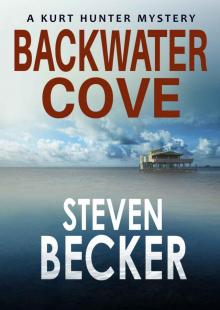 Backwater Cove
Backwater Cove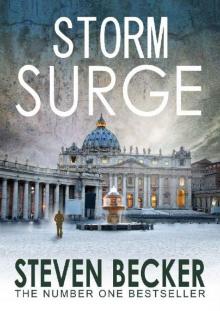 Storm Surge: A Fast Paced International Adventure Thriller (Storm Thriller Series Book 3)
Storm Surge: A Fast Paced International Adventure Thriller (Storm Thriller Series Book 3)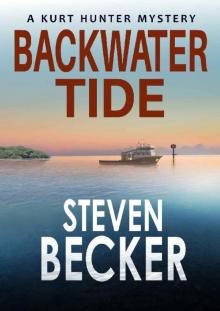 Backwater Tide
Backwater Tide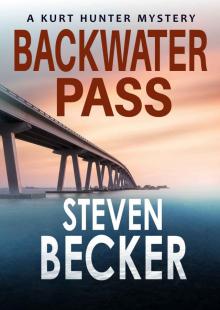 Backwater Pass
Backwater Pass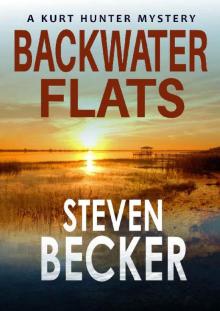 Backwater Flats
Backwater Flats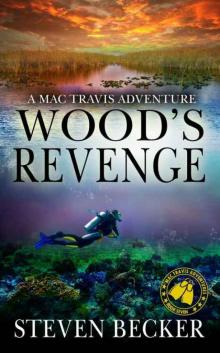 Wood's Revenge
Wood's Revenge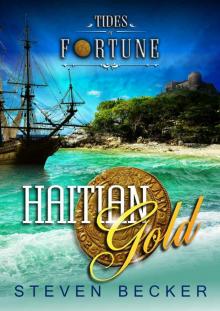 Haitian Gold
Haitian Gold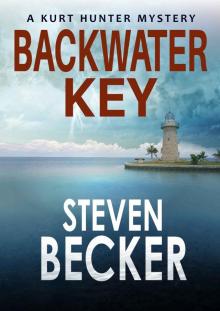 Backwater Key
Backwater Key Wood's Tempest
Wood's Tempest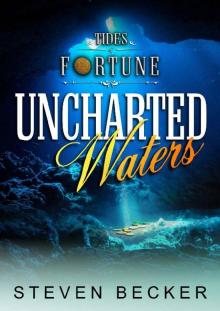 Uncharted Waters
Uncharted Waters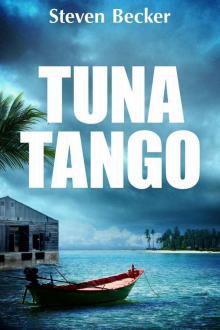 Tuna Tango
Tuna Tango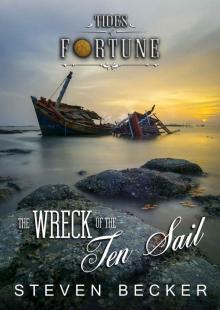 The Wreck of the Ten Sail
The Wreck of the Ten Sail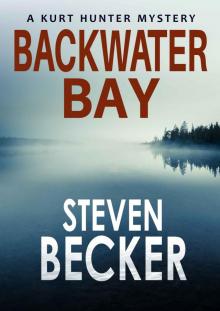 Backwater Bay (Kurt Hunter Mysteries Book 1)
Backwater Bay (Kurt Hunter Mysteries Book 1) Storm Clouds
Storm Clouds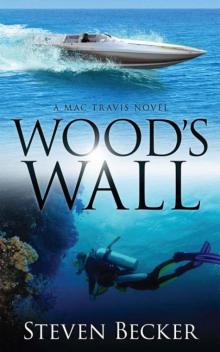 Wood's Wall
Wood's Wall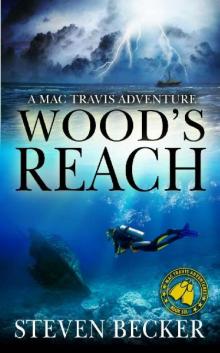 Wood's Reach
Wood's Reach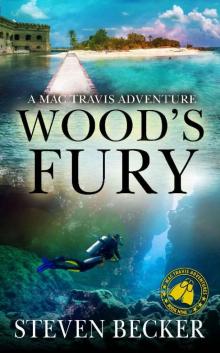 Wood's Fury
Wood's Fury Storm Rising
Storm Rising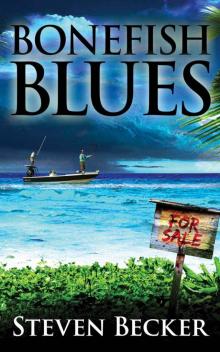 Bonefish Blues
Bonefish Blues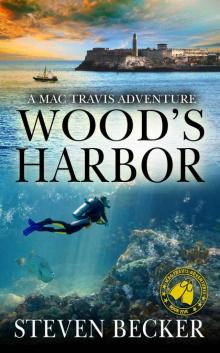 Wood's Harbor: Action & Sea Adventure in the Florida Keys (Mac Travis Adventures Book 5)
Wood's Harbor: Action & Sea Adventure in the Florida Keys (Mac Travis Adventures Book 5)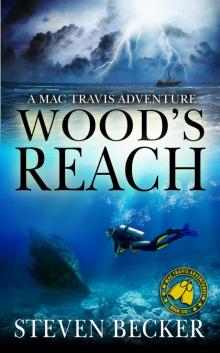 Wood's Reach: Action & Sea Adventure in the Florida Keys (Mac Travis Adventures Book 6)
Wood's Reach: Action & Sea Adventure in the Florida Keys (Mac Travis Adventures Book 6)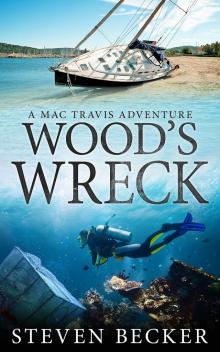 Wood's Wreck
Wood's Wreck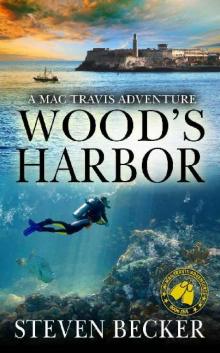 Wood's Harbor
Wood's Harbor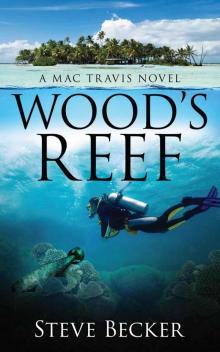 Wood's Reef
Wood's Reef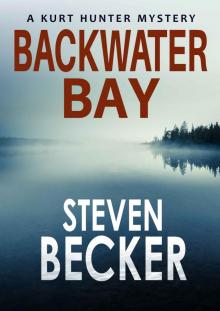 Backwater Bay
Backwater Bay